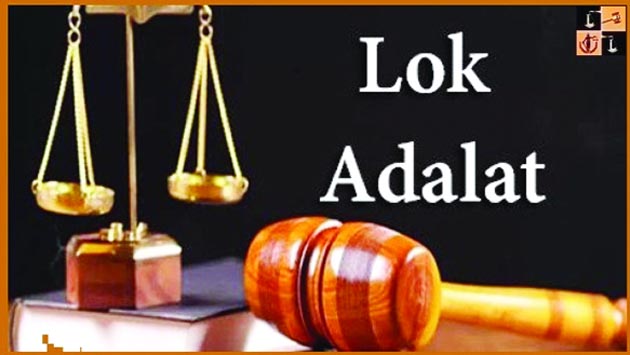Mohd Mustkeem Baig
Lok Adalat is one of the alternative dispute redressal mechanisms, it is a forum where disputes or cases pending in the court of law or at pre-litigation stage are settled or compromised amicably. Lok Adalats have been given statutory status under the Legal Services Authorities Act, 1987. Under the said Act, the award (decision) made by the Lok Adalats is deemed to be a decree of a civil court and is ultimate and obligatory on all parties and no appeal against such an award lies before any court of law. If the parties are not satisfied with the award of the Lok Adalat though there is no provision for an appeal against such an award, but they are free to initiate litigation by approaching the court of appropriate jurisdiction by filing a case by following the required procedure, in exercise of their right to litigate. Cases includes matrimonial disputes, property disputes, motor accident claims, land acquisition, compensation, service and labour, are listed for speedy disposal.
But how far the overburdened judiciary has been able to provide respite to the litigants is a question to be asked. In Jammu and Kashmir with lakhs court cases yet to be disposed of across the higher and lower judiciary, Lok adalats have been able to contribute plenty in providing relief to a huge chunk of society who awaits justice and speedy resolution to their lawsuit. But the main question that arises out of the working of Lok Adalats is the scale of adjudication aggrieved parties can obtain at the hands of Lok Adalats. The High Court of Jammu and Kashmir and Ladakh recently observed that there is no power vested with Lok Adalats to dismiss a case referred to it for non-prosecution or if a party fails to appear before it. Justice Sanjay Dhar clarified that the Lok Adalat can either pass an award if the parties before it arrive at a settlement or (if no such settlement is reached) refer the case back to the court concerned for its disposal under law. There remains no manner of doubt that a Lok Adalat can pass an award only if the parties arrive at compromise or settlement. In case no such compromise or settlement is arrived at, the only option available with the Lok Adalat is to refer the case back to the concerned Court for its disposal under law. There is no power vested with the Lok Adalat to dismiss a case referred to it for non-prosecution. In view of this, the Court concluded that the Lok Adalat did not have any power to dismiss the petitioner’s case only because he did not appear before it.
Another aspect of Lok Adalat which may seem uncomfortable to the parties is the Confidentiality. Lok Adalat proceedings are generally held in open court, so anyone can witness them. This can result in imposing pressure on one party or another for amicable settlement even if he/she is not willing to agree upon. The system is based on compromise and settlement between the parties, which can sometimes lead to injustice and again parties have to return to the lengthy process of the court which can delay the justice. But it is noteworthy and cannot be overlooked that Lok Adalats has been able to cater a vast majority of people awaiting justice who have been kicking ones heels for a long time in pursuit of resolution.
On 10th of August a Special Lok Adalat was organized throughout the UT of J&K with special emphasis on amicable settlement of Compoundable Cases that were pending for disposal before various courts in UT of J&K. This was the 8th Special Lok Adalat of the current calendar year. A total of 994 cases were taken up in the Special Lok Adalat, out of which 425 cases were amicably settled and the next special lok Adalat shall be held on Friday, August 23, 2024, focusing on the settlement of Consumer Cases. The initiatives of Legal Services Authorities are considerably working on a rapid scale in Union Territory of Jammu & Kashmir and Union Territory of Ladakh as over 13.67 lakh pending cases have been disposed of in the Lok Adalats conducted since 2021. Banks have reached out to the Government, making a case for more frequent Lok Adalats to be held through Debt Recovery Tribunals, or DRTs, to settle distressed loans out of court. Under existing laws, banks can take cases where the loan outstanding does not exceed Rs 20 lakh to the Lok Adalat forum to try to settle it amicably with the borrower. In FY23, throughout India around 14.2 million cases involving Rs 1.88 lakh crore were referred to Lok Adalats, and banks recovered around Rs 3,831 crore. If the government can push state-level authorities to organise more Lok Adalat camps, many of the cases will be disposed of quickly. The speedy trial and procedural flexibility of the disputes under Lok Adalat has resulted in easing the overburdened Judiciary. There is no strict application of procedural laws like the Civil Procedure Code and the Evidence Act while assessing the claim by Lok Adalat. Parties are somehow mentally prepared for the amicable settlement of their dispute when their case is referred to the Lok Adalat. In another case general public has also been benefitted in settlement of Traffic Challans at Lok Adalat This replaces the initial higher penalty amounts which the authorities set during the event, but allows most people to clear their bills without a lot of strain on their pockets. With an increasing number of cases and huge pendency in the courts Lok Adalats should be organized more often so that the settlements should be done more meticulously and rapidly.
(The author is advocate High Court of Jammu & Kashmir and Ladakh)
Trending Now
E-Paper


